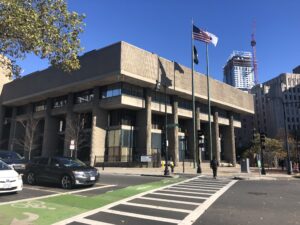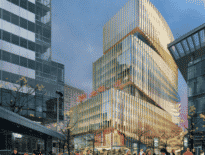The Massachusetts Historical Commission has instructed state real estate officials to consider preserving the Charles F. Hurley Building in Boston’s West End, the site of a potential 1.3-million-square-foot redevelopment.
Gov. Charlie Baker is seeking to ground-lease the property to a private developer.
Stantec and Bruner/Cott Architects originally provided the administration with four redevelopment scenarios, three of which would carve out a portion of the Hurley state offices building for demolition and leave 73,000 to 298,000 square feet remaining. The fourth would demolish the entire building. Part of the new tower would be built on a portion of the courtyard behind the building.
In a letter dated Feb. 25, the Massachusetts Historic Commission ordered DCAMM to consider additional options: retaining and renovating the Hurley building, and retaining and renovating the building while proposing new construction.
“The MHC recognizes the challenges of retrofitting aging buildings to meet current standards and code,” Executive Director Brona Simon wrote. “Thousands of buildings in the Commonwealth have managed to accommodate modern services while retaining vast amounts of architecturally significant spaces and materials, proving that rehabilitation of historic buildings is a viable option.”
DCAMM officials say the building needs $200 million in repairs, and a private redevelopment including replacement state offices would provide better long-term cost predictability. The Hurley building is plagued by roof leaks, an outdated electrical system and inefficient interior layout, according to DCAMM.
Preservationists and Modernist architecture groups have rallied to block the development.
“The one option they should stick with is the one they completely avoided: just doing a retrofit and an addition without destroying the exterior of the building,” said Kelvin Dickinson, president of the New York-based Paul Rudolph Heritage Foundation. “It was basically a developer’s wish list of building options.”
Modernist architect Paul Rudolph was master planner for the larger Government Services Center complex, and designed the Lindemann Mental Health building which would not be redeveloped.
Boston zoning allows buildings up to 400 feet tall on the property.
The historical commission response kicks off an informal review that will include meetings between DCAMM and preservation groups, said Greg Galer, executive director of the Boston Preservation Alliance.
DCAMM previously said it planned to issue a request for proposals from private developers in the second half of 2020.









